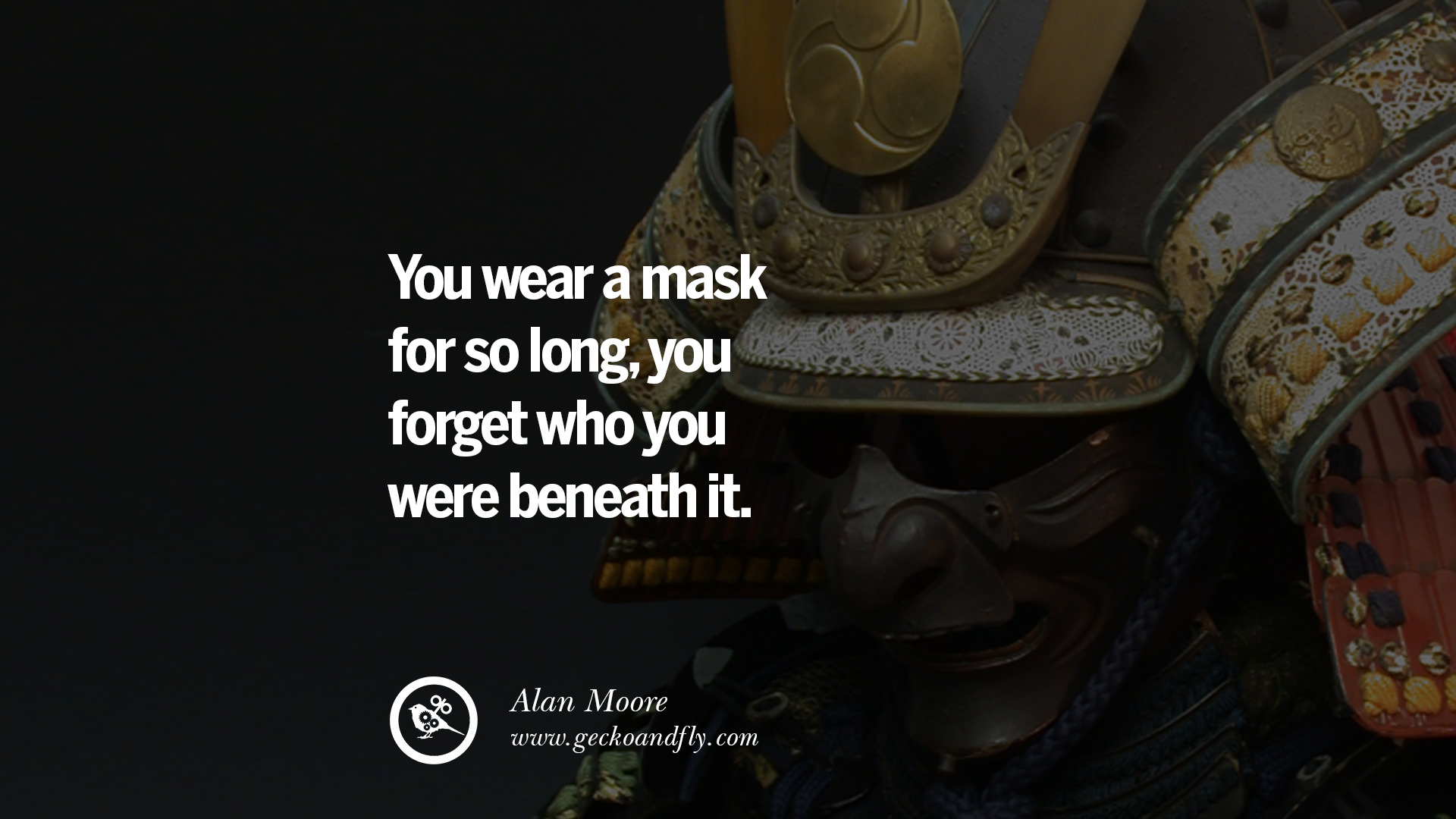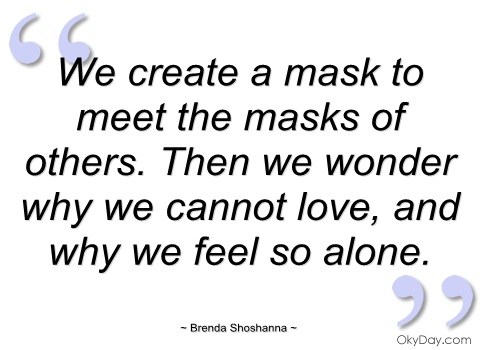 |
| via |
What
The mask is a small portion of psychology, which I am very interested in, there are also subpersonalities, ego states, defensive structures and armouring. A mask is something we wear, a default face, to hide our deeper feelings and emotions. We mask our inner thoughts and emotions, that's where the word comes from. What we show the world is a controlled version of ourself. There are many, many masks one can wear. The blank and happy masks are the most common in our lives today. To a certain extent, we all wear masks.
Why
For what reason do we want to be someone we really aren't? The answer is simple and default: to protect ourselves. No one wants to get hurt emotionally. No one wants to be vulnerable. When we hide our emotions, we become unreadable. People will not easily assume as much. They won't be able to manipulate our emotions as easily.
Examples
Say, if you get scolded by your parent, teacher, boss, or just any random person. If you show any signs of embarrassment, guilt, fear, anxiousness, it will seem like you've finally crumbled and the person would have won. Or take another case: bullying. If one is being bullied by bully who takes pleasure in seeing others cry out in pain, or simply showing fear, chances are, this kid won't be bullied for long as he controls his pain and doesn't give in. He doesn't let the bully win.
One very good example of someone who has mastered the blank mask, or the Yamani mask, as it is often referred to in the books, is Keladry of Mindelan. In the series Protector of the Small by Tamora Pierce, the Yamani people mask their emotions because they believe that emotion is weakness. It's often misunderstood - showing emotion itself is not particularly weakness - but revealing one's emotions without proper thought and control, especially to their enemy, may result in vulnerability which can be taken advantage of.
This character, Kel, often wears a blank, unreadable, emotionless mask which in her case is useful when she is the only girl in medieval knight training. She becomes stoic. It's better for her that way. When people say 'girls get hurt easily, they're sensitive and emotional', she breaks that stereotype. Her mask is her advantage, her weapon. It protects her from being vulnerable 'like a girl' at certain times.
Another type of mask is the positive, happy mask. Let's assume the user is a girl. She makes others believe that she is happy and all's well in her world. A wide, seemingly joyful smile is constantly plastered onto her face. Those around her think that she's all puppies, rainbows and unicorns. Behind that mask of sunshine, she may be crumbling, deteriorating, crying for help. In this situation, there's may be to reasons behind her mask. She pretends she's happy to hide her true self, her real story, to avoid pity and embarrassment. The other reason is to bring joy to others.
How
How then, you ask, can we master this tactic of wearing masks? It bores down to one word: practice. For my blank mask, which I'm still working on, is without any facial expression. It can also work as a 'serious' face. My cheekbones are somewhat tensed (or relaxed, depending on how you look at it), eyes look straight ahead, lips sealed but not forcefully pressed together. Breathe as per normal.
When wearing masks, you usually tend to have a specific tone to match that mask. With the blank mask might be the monotonous, emotionless voice. The happy mask may be portrayed with an enthusiastic, light and joyful voice.
Sometimes, whether it's suppressing unnecessary anger, pain, annoyance, grief or any other emotion, one way is to grit your teeth. Or you could clench your fists - behind your back, of course.
Side effects
Masks also prevent others from getting to know the real us. It creates a distance between you and the person. People yearn to get to know you, to get closer to you, to be your friend. But your mask prevents them from actually knowing who you really are. Wearing a mask is like having this invisible wall around you, like the Protego spell in Harry Potter, which causes causes minor to moderate jinxes, curses, and hexes to rebound upon the attacker (source).
Wearing masks too often results in your emotions being suppressed. What you feel is not felt by those around you. Whether it's annoyance, pride, anger or anything else, it's just something which you keep to yourself. The message is not passed to the person. When you're irritated by a person, if you don't tell the person or even show an irritated expression, it will just build up in yourself.
Takeaway
A mask is meant to protect you from being vulnerable around people who you do not wish to see you that way. It is not a high wall you build around yourself that traps you inside and leaves your loved ones outside, with them having no idea how you feel or how you actually are.
The least you could do, is take off your masks, at least when you're alone, is to take off your mask and find yourself. Rediscover who you really are. Your unique, authentic soul, which you should preserve and not let any mask distort it.
Showing and feeling positive emotions, such as pride, excitement, love, is a medicine that no money can ever buy.
Laughing can decreases stress hormones and increases immune cells and infection-fighting antibodies, thus improving your resistance to disease. Laughter triggers the release of endorphins, the body's natural feel-good chemicals. Endorphins promote an overall sense of well-being and can even temporarily relieve pain. (Source)Go watch a sad movie, and instead of taking in the scene and sounds before you, do not be afraid to let out your emotions, instead of just containing it within you. Go to the beach, soak in the sunshine and seamist, and show people around you that you are relaxed and enjoying it. Go and try out my Reasons to Smile challenge.
I guess a mask is okay when interacting with strangers, people you're not close with. However, when around people you trust greatly and love very much, please, take off your mask. Be yourself. Be not afraid to show them what you feel. Create chances for intimacy, for bonding. Take off your mask, remind them who you are. Spend more time with these people where you can be yourself. Feel more.







This was really interesting and insightful - I especially liked the depth you went to, relating it to Tamora Pierce's books. Thanks for making me think a little deeper this evening!
ReplyDeleteGlad you liked it!
DeleteHey Zelus, thanks for commenting back on my blog. This was so amazing to read: I love psychology myself, too, and the 'phenomenon' of the mask is certainly quite interesting.
ReplyDeletex Yasmine// Cloudy
I'm really glad you liked it! I'm hoping to learn more about psychology too, it's really fascinating.
DeleteSometimes I feel like masks are a second-nature though, and it's not like you know when you're putting one on. I feel like I have no idea who I am under my mask, because my mask must be who I am now. I have so much trouble distinguishing whether how I act on the outside is really reflecting how I feel on the inside. Now that I think about it, it probably doesn't because how much can you convey of yourself to others without seeming too serious? How do you talk to people without being something you're not without knowing it? The concept of a mask is definitely real, but how to eradicate it is so much harder than just realising it's there.
ReplyDelete-M
The Life of Little Me
The idea of having no masks at all seems rather scary and impossible at the same time. I think the only humans who don't have masks are young, innocent children. As we grow older, experience more and interact with more people, we craft different masks and sometimes glue on some masks. Like André Berthiaume said, “We all wear masks, and the time comes when we cannot remove them without removing some of our own skin.”
DeleteThe idea of masks is an aspect that we should think about more and address. It's a very wide topic.